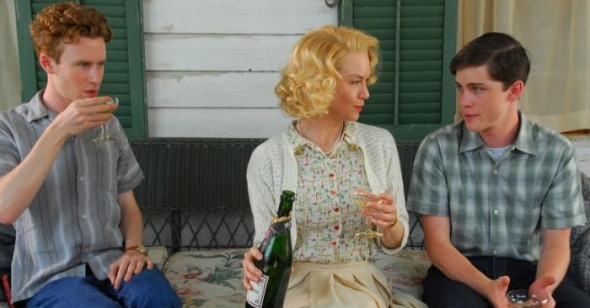Due South
By Emily Condon
My One and Only
Dir. Richard Loncraine, U.S., Freestyle Releasing
After Anne Deveraux, an equal parts desperate and crazy Southern firecracker (played with extra pluck by Renée Zellweger) walks in on her philandering bandleader husband (Kevin Bacon, affecting a rather perplexing rasp) in bed with another woman, she empties out the safe deposit box, splurges on an extravagant convertible, gathers up her two teenage boys—the sensitive, bookish George (Logan Lerman), and his older and somewhat more effeminate brother, Robbie (a charming but underused Mark Rendall)— and takes to the interstate to find herself a new husband. My One and Only, directed by Richard Loncraine (Richard III, Wimbledon), follows the trio as they navigate a series of potential suitors and long stretches of Route 66; predictably, their journey doesn’t quite proceed as planned.
Nearing the age where women—or at least women like her—start to wilt, Anne suffers through a handful of horrendous men (abuse and mental illness are among the subjects played for bittersweet yuks) and ample humiliations before she steamrolls into Hollywood. As soon as they arrive, she enlists whomever she can cajole into helping Robbie realize his wish to become a movie star. But throughout their travails, she earns the scorn of the practically minded and responsible George. On their trip, Anne advises George that one must always ignore the past and instead look to the future with unbounded optimism—to convey this message she insists he resist the urge to look in the rearview mirror. (Not the most sage advice from a mother, perhaps, but that’s neither here nor there). But George can’t embrace his mother’s half-cracked, carefree abandon, and the two of them bicker, fight, and flee from each other when things get hard. As in so many films of its ilk, it takes a small tragedy for these characters to shatter their respective armors and see eye-to-eye.
It may be germane at this point to note one of the stranger elements of My One and Only—the film is in fact based on the coming of age of über-tan quasi-celebrity George Hamilton, veteran of such notable fare as Crocodile Dundee in Los Angeles, Double Dragon: The Movie, and TV’s Dynasty, as he relayed it to Merv Griffin. Hollywood, it seems, is bursting with stories waiting to be told, including those one never, ever would have wondered about. Hamilton himself served as one of the film’s executive producers, though he apparently wasn’t directly involved in the production.
As with other recent back-story dramatizations (think the B.I.G. biopic Notorious), the film suffers its share of credibility problems. In what might be called the climactic scene, George shows up at the studio back lot where Robbie is mangling his performance as an earnest cowboy. Giving his brother a pep talk, George delivers a reading of Robbie’s lines that’s so impassioned he lands his first contract—it’s his star-making moment, and it’s supposed to feel like victory. But since the scene opens with George alighting from a cab, fresh from New York, it seems impossible that he could know the lines. Indeed, George on numerous occasions possesses the kind of special knowledge unique to psychics and movie characters. Regardless of whether this is due to lazy writing, poor editing, or magical thinking on the part of either screenwriter Charlie Peters or Hamilton, such holes effectively cripple the film’s integrity. My One and Only is vaguely diverting, the kind of movie that might be pleasant for whiling away a Sunday afternoon, but in straddling the line between childhood fantasy and biographical period picture, the film fails to satisfactorily deliver either.
But implausibility isn’t My One and Only’s biggest flaw—its larger dilemma, one that in some sense falls outside the parameters of the film itself and that the more prudish might characterize as a moral failing, lies in its unabashed celebration of Hollywood as a vessel of redemption. The film rejoices in the evolution of the upstanding, sensitive, writerly young George into a man we know as a grinning lothario whose greatest claims to fame are excessively bronzed skin, and numerous guest appearances on TV murder mysteries. Can we call this victory?
The fame on display that may be even more troubling than Hamilton’s, however, belongs to the film’s moxie-mottled leading lady, Renée Zellweger, whose performances over the years have increasingly devolved into little more than a succession of tics and squints. Watching the star swish her hips and purse her lips and pull her best pillbox over her champagne-colored coiffure, this viewer found it nearly impossible to stave off a niggling query: what’s the matter with her face?
Now, it may be unfair to reduce a major motion picture, the fruit of many undoubtedly talented people’s hard work, into one snarky remark, to make fun of a woman approaching middle age who clearly tries (and occasionally succeeds) to breathe life into her self-consciously quirky single Southern mom role. But watching Zellweger’s attempts at recognizable human expression grow more contorted—whether due to Botox or cheek implants, or some other more mysterious procedure—it becomes awfully difficult to buy the film’s ostensible ethos that women should feel comfortable aging gracefully regardless of male approval, and that we should embrace our flaws with pride. In both its content and its casting, My One and Only champions the transformation of healthy middle Americans—whether they be earnest young characters with writing ambitions or a Texan actress who used to look and emote like an actual person—into dental-capped and chemical-peeled Hollywood dolls. This may be par for the course for a man whose career highlights include romping alongside Mae West, Dom DeLuise, Ringo Star, and Alice Cooper in a raucous musical comedy called Sextette, but for the rest of us, it feels like an unhappy ending.
